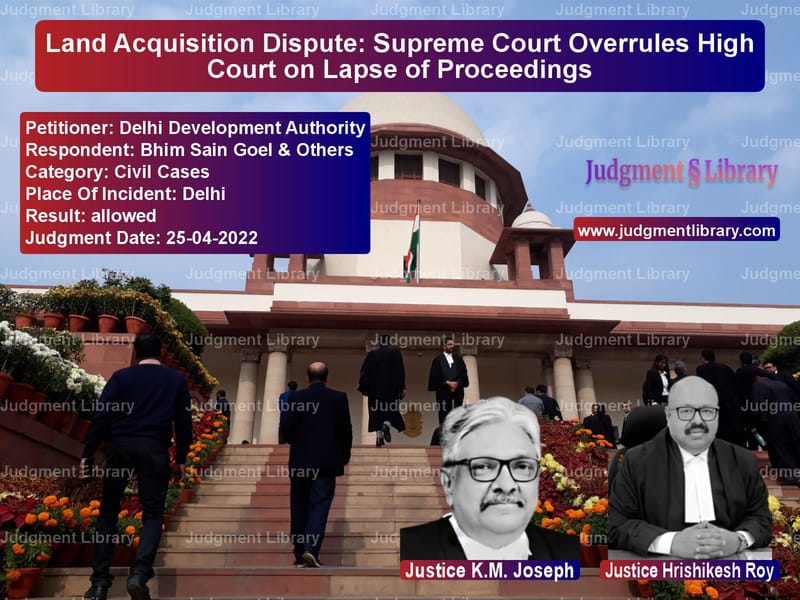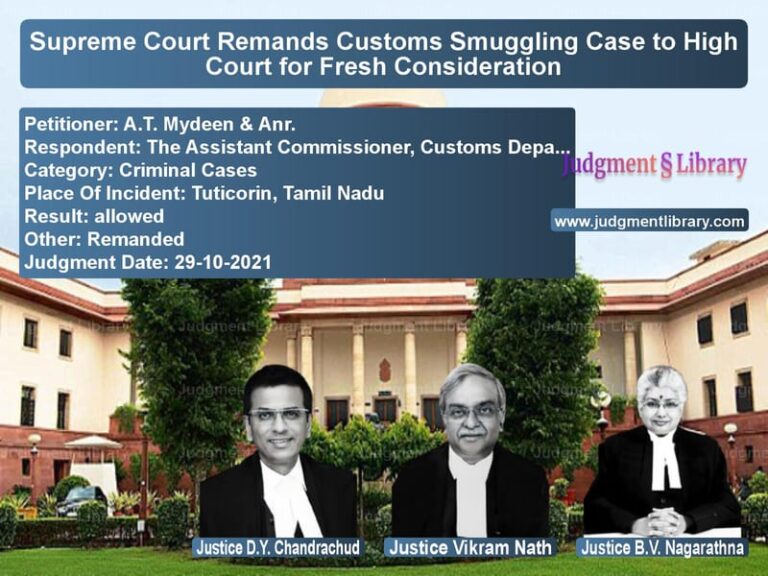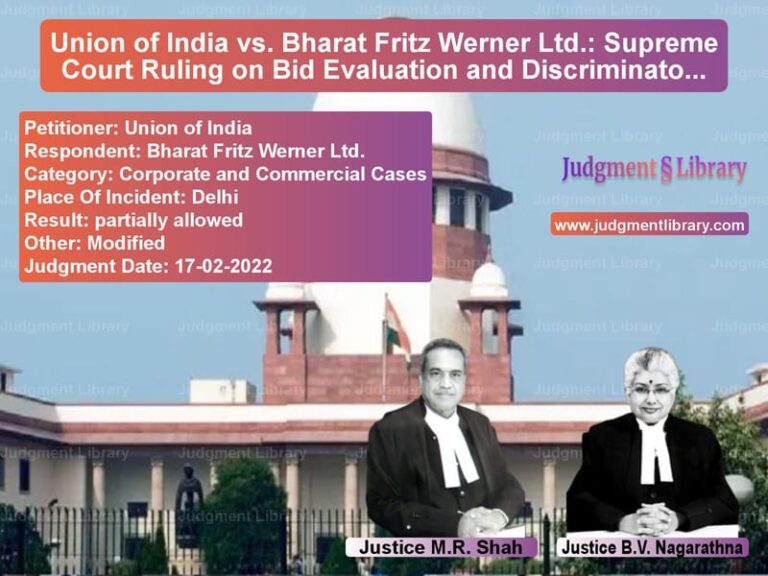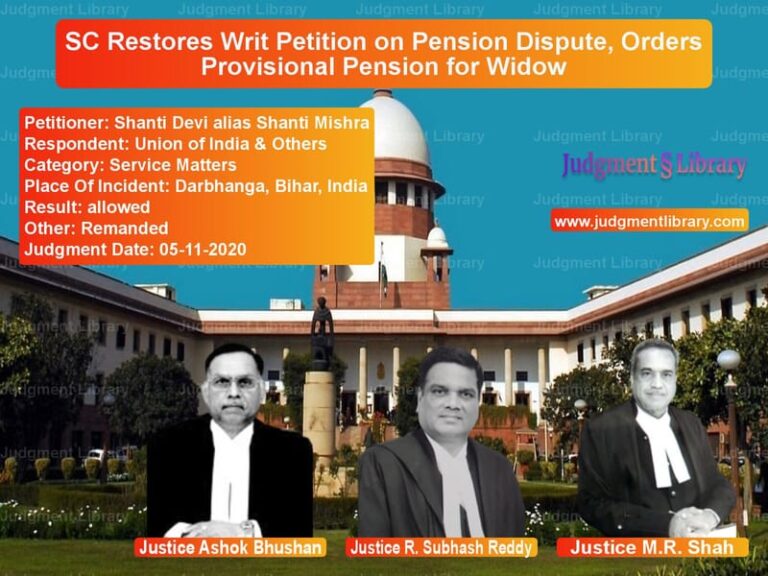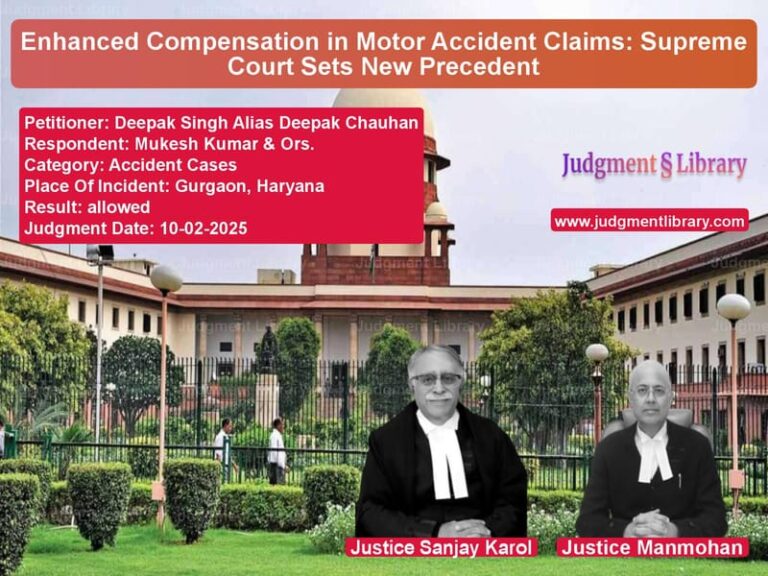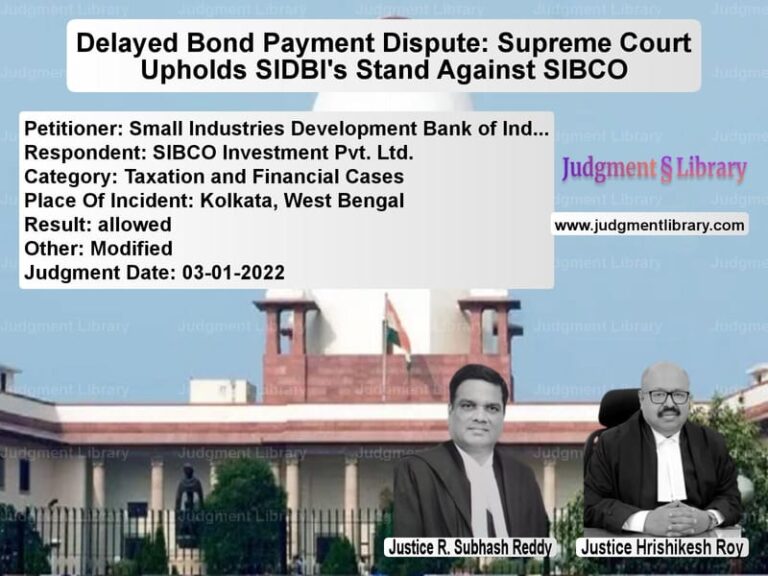Land Acquisition Dispute: Supreme Court Overrules High Court on Lapse of Proceedings
The Supreme Court of India recently delivered a crucial ruling in the case of Delhi Development Authority vs. Bhim Sain Goel & Others, which dealt with the application of Section 24(2) of the Right to Fair Compensation and Transparency in Land Acquisition, Rehabilitation, and Resettlement Act, 2013. The case revolved around whether land acquisition proceedings under the Land Acquisition Act, 1894, had lapsed due to non-payment of compensation and failure to take possession.
The Supreme Court overturned the Delhi High Court’s decision, which had held that the acquisition had lapsed. The ruling emphasized that landowners cannot use judicial proceedings and stay orders to prevent possession and later claim that the acquisition has lapsed under the 2013 Act.
Background of the Case
The case pertained to a land acquisition process initiated in Delhi. A notification under Section 4 of the Land Acquisition Act, 1894, was issued on March 21, 2003, followed by a declaration under Section 6 on March 18, 2004. The acquisition was finalized with an award issued on August 22, 2005.
However, the landowners challenged the acquisition in the Delhi High Court, obtaining an interim order preventing the authorities from taking possession of the land. The matter remained pending, and with the enactment of the 2013 Act, the landowners claimed that the acquisition had lapsed under Section 24(2) because possession had not been taken and compensation had not been paid.
The Delhi High Court ruled in favor of the landowners, holding that since five years had passed without the government taking possession or paying compensation, the acquisition had lapsed. The Delhi Development Authority (DDA) appealed this decision before the Supreme Court.
Petitioners’ Arguments
The DDA, represented by Senior Advocate Sanjay Poddar, argued that:
- The High Court had failed to consider that possession could not be taken due to the stay orders obtained by the landowners.
- As per the Supreme Court’s Constitution Bench ruling in Indore Development Authority vs. Manoharlal (2020), the period of judicial stay must be excluded when calculating the five-year limit under Section 24(2).
- The landowners had actively litigated to prevent possession, and they could not now claim the benefit of Section 24(2) to argue that the acquisition had lapsed.
- Compensation was offered, but the landowners refused to accept it.
- The authorities acted in good faith, and lapsing of the acquisition would set a dangerous precedent where landowners could indefinitely delay possession and later claim benefits under the new law.
Respondents’ Arguments
The landowners, represented by Advocate Pranab Kumar Mullick, countered that:
- The authorities had failed to complete the acquisition process in a timely manner.
- Under Section 24(2) of the 2013 Act, if possession had not been taken and compensation had not been paid within five years before the commencement of the Act (i.e., by January 1, 2014), the acquisition should be deemed to have lapsed.
- The delay in possession was not their fault but rather due to inefficiencies of the acquiring authority.
- The High Court had correctly applied the precedent set in Pune Municipal Corporation vs. Harakchand Misirimal Solanki (2014), which ruled that non-payment of compensation results in lapsing of acquisition.
Supreme Court’s Judgment
The Supreme Court, comprising Justices K.M. Joseph and Hrishikesh Roy, ruled in favor of the DDA, setting aside the High Court’s decision. The key observations made by the Court were:
- Stay Orders and Possession: The Court held that possession could not be taken because of interim orders secured by the landowners themselves. It ruled that the period during which the authorities were legally restrained from taking possession must be excluded when considering the five-year limit under Section 24(2).
- Judicial Precedent: The Court reaffirmed its Constitution Bench decision in Indore Development Authority vs. Manoharlal, which held that landowners who prevent possession through litigation cannot later claim lapsing of acquisition.
- Doctrine of Restitution: The Court applied the principle that a litigant should not be allowed to benefit from their own wrong. Since the landowners delayed the process through judicial proceedings, they could not claim that the acquisition had lapsed due to non-possession.
- Compensation Payment: The Court noted that refusal to accept compensation did not mean the government had failed in its duty. The authorities had attempted to discharge their obligations, and landowners could not use technicalities to invalidate the acquisition.
- Public Interest Considerations: The Court emphasized that allowing the landowners’ argument would set a precedent where land acquisition could be indefinitely delayed, harming essential public projects.
Implications of the Judgment
This ruling has several significant implications:
- Prevention of Abuse of Law: The decision prevents landowners from using stay orders to delay possession and then claiming lapsing of acquisition under Section 24(2).
- Clarification of Judicial Precedents: It reinforces the principle established in Indore Development Authority, ensuring that the five-year period does not include time lost due to litigation.
- Fair Treatment to Acquiring Authorities: The judgment ensures that government agencies are not unfairly penalized for delays caused by legal challenges.
- Public Interest Protection: The ruling protects infrastructure projects from being derailed by technical loopholes in land acquisition laws.
Conclusion
The Supreme Court’s ruling in Delhi Development Authority vs. Bhim Sain Goel & Others provides much-needed clarity on the interpretation of Section 24(2) of the 2013 Act. By ruling that possession delays caused by judicial orders should not count towards the five-year period, the Court has prevented potential misuse of the law. This decision strengthens the acquisition process while ensuring that public projects are not unduly stalled due to prolonged litigation by landowners.
Read also: https://judgmentlibrary.com/supreme-court-rejects-review-petition-in-specific-performance-suit/
Petitioner Name: Delhi Development Authority.Respondent Name: Bhim Sain Goel & Others.Judgment By: Justice K.M. Joseph, Justice Hrishikesh Roy.Place Of Incident: Delhi.Judgment Date: 25-04-2022.
Don’t miss out on the full details! Download the complete judgment in PDF format below and gain valuable insights instantly!
Download Judgment: delhi-development-au-vs-bhim-sain-goel-&-oth-supreme-court-of-india-judgment-dated-25-04-2022.pdf
Directly Download Judgment: Directly download this Judgment
See all petitions in Property Disputes
See all petitions in Damages and Compensation
See all petitions in Landlord-Tenant Disputes
See all petitions in Judgment by K.M. Joseph
See all petitions in Judgment by Hrishikesh Roy
See all petitions in allowed
See all petitions in supreme court of India judgments April 2022
See all petitions in 2022 judgments
See all posts in Civil Cases Category
See all allowed petitions in Civil Cases Category
See all Dismissed petitions in Civil Cases Category
See all partially allowed petitions in Civil Cases Category

